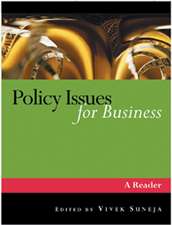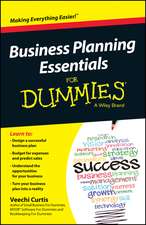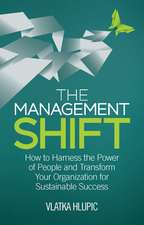International Handbook of Organizational Crisis Management
Autor Christine M. Pearson, Christophe Roux-Dufort, Judith A. Clairen Limba Engleză Hardback – 6 aug 2007
Preț: 1079.19 lei
Preț vechi: 1478.35 lei
-27% Nou
Puncte Express: 1619
Preț estimativ în valută:
206.51€ • 216.60$ • 171.91£
206.51€ • 216.60$ • 171.91£
Carte tipărită la comandă
Livrare economică 01-15 aprilie
Preluare comenzi: 021 569.72.76
Specificații
ISBN-13: 9780761988519
ISBN-10: 0761988513
Pagini: 368
Dimensiuni: 178 x 254 x 25 mm
Greutate: 0.81 kg
Ediția:1
Editura: SAGE Publications
Colecția Sage Publications, Inc
Locul publicării:Thousand Oaks, United States
ISBN-10: 0761988513
Pagini: 368
Dimensiuni: 178 x 254 x 25 mm
Greutate: 0.81 kg
Ediția:1
Editura: SAGE Publications
Colecția Sage Publications, Inc
Locul publicării:Thousand Oaks, United States
Cuprins
Introduction
I. New Risks, New Crises, New Dangers
Chapter 1: Organizations in World Risk Society - Ulrich Beck & Boris Holzer
Chapter 2: Crisis Management and Legitimacy: Facing Symbolic Disorders - Romain Laufer
Chapter 3: Understanding and Managing Crises in an "Online World" - Sarah Kovoor-Misra & Manavendra Misra
II. New Crises, New Meaning
Chapter 4: Organizational Sensemaking During Crisis - Karlene H. Roberts, Peter Madsen, & Vinit Desai
Chapter 5: Crisis Sensemaking and the Public Inquiry - Robert P. Gephart, Jr.
Chapter 6: A Cognitive Approach to Crisis Management in Organizations - Jean-Marie Jacques, Laurent Gatot & Anne Wallemacq
III. New Crises, New Barriers
Chapter 7: The Psychological Effects of Crisis: Deny Denial --- Grieve Before a Crisis Occurs - Ian I. Mitroff
Chapter 8: A Passion for Imperfections: Revisiting Crisis Management - Christophe Roux-Dufort
Chapter 9: The Eight Characteristics of Japanese Crisis-Prone Organizations - Toshihiko Hagiwara
Chapter 10: Voices From the Terrace: From "Mock Bureaucracy" to Learning From Crisis" Within the UK's Soccer Industry - Dominic Elliott & Denis Smith
IV. New Crises, New Solutions
Chapter 11: A "Total" Responsibility Management Approach to Crisis Management and Signal Detection in Organizations - Judith Clair & Sandra Waddock
Chapter 12: Crisis Management Simulations: Flaws and Remedies - Bertrand Robert & Christopher Lajtha
Author Index
Subject Index
About the Editors
About the Contributors
I. New Risks, New Crises, New Dangers
Chapter 1: Organizations in World Risk Society - Ulrich Beck & Boris Holzer
Chapter 2: Crisis Management and Legitimacy: Facing Symbolic Disorders - Romain Laufer
Chapter 3: Understanding and Managing Crises in an "Online World" - Sarah Kovoor-Misra & Manavendra Misra
II. New Crises, New Meaning
Chapter 4: Organizational Sensemaking During Crisis - Karlene H. Roberts, Peter Madsen, & Vinit Desai
Chapter 5: Crisis Sensemaking and the Public Inquiry - Robert P. Gephart, Jr.
Chapter 6: A Cognitive Approach to Crisis Management in Organizations - Jean-Marie Jacques, Laurent Gatot & Anne Wallemacq
III. New Crises, New Barriers
Chapter 7: The Psychological Effects of Crisis: Deny Denial --- Grieve Before a Crisis Occurs - Ian I. Mitroff
Chapter 8: A Passion for Imperfections: Revisiting Crisis Management - Christophe Roux-Dufort
Chapter 9: The Eight Characteristics of Japanese Crisis-Prone Organizations - Toshihiko Hagiwara
Chapter 10: Voices From the Terrace: From "Mock Bureaucracy" to Learning From Crisis" Within the UK's Soccer Industry - Dominic Elliott & Denis Smith
IV. New Crises, New Solutions
Chapter 11: A "Total" Responsibility Management Approach to Crisis Management and Signal Detection in Organizations - Judith Clair & Sandra Waddock
Chapter 12: Crisis Management Simulations: Flaws and Remedies - Bertrand Robert & Christopher Lajtha
Author Index
Subject Index
About the Editors
About the Contributors
Notă biografică
Descriere
Best-managed crises can bring positive recognition and enhance an organization's value; worst-managed crises can snuff its viability. Numerous books have been written on the topic, but many lack rigor: prescriptions are untested and quick fixes are based on elevating the readers' fears. The International Handbook of Organizational Crisis Management reflects the latest understanding of this field from prominent scholars and practitioners around the globe. Pushing the boundaries of crisis management research and practice, this book offers new frameworks and findings that capture insights and guidance for researchers and executives. Today's crises require no less. Novel and poorly understood technologies, globalization, changing political climates, and a shifting social landscape are just a few of the forces currently changing the ways in which organizations experience crises. The International Handbook of Organizational Crisis Management is a grounded cross-section of informed perspectives, a leading edge overview of the field of crisis management that will be useful to researchers and thoughtful practitioners.















